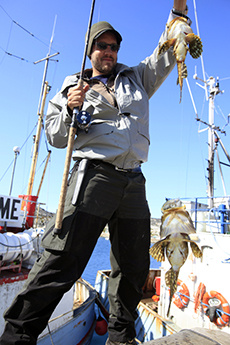Shape up quickly – applies to fish too!

Erik Sandblom with a couple of shorthorn sculpins caught off Disko Island in Greenland.
Climate change continues apace thanks to increasing levels of greenhouse gases in the atmosphere. The greenhouse effect has led not only to an increase in average temperatures but also to more extreme weather conditions, such as major heatwaves.
More than just survival
In contrast to birds and mammals, fish are ectothermic, which means that their body temperature fluctuates in line with the temperature of their surroundings. Fish that live at different temperatures can generally do so because they are able to optimise their bodily functions to that particular temperature. Changes in the ambient temperature can therefore disrupt this balance.
“Previous research has focused almost exclusively on whether different species will be able to survive an increase in temperature or not,” says Erik Sandblom, researcher at the University of Gothenburg's Department of Biological and Environmental Sciences. “We were interested in finding out how species that survive actually manage to do so, how long it takes and the limitations they have to contend with during the acclimation period.”
Most vulnerable during the first few weeks
In the published trial the researchers simulated a temporary heatwave and then monitored how the physiology of the shorthorn sculpin, a common marine bottom-dwelling fish species, was affected. The results show that during the first week of the heatwave the fish were severely restricted and were forced to forego high-energy processes such as eating or swimming in order to survive.
“During the first few weeks of a sudden heatwave the fish do survive but are vulnerable to events that would otherwise pass without problem. Dealing with extra challenges such as escaping from predators or coping with disease can be fatal.”
Amount of time decisive
The trial took eight weeks and the results show that the physiological load reduces with each passing week as the fish gradually manage to reset their bodily functions and acclimate to the new environment. The results also show that the “cost” to the fish correlates closely with how long it takes to adjust. In a future that is both warmer and more variable, it is therefore likely to be important not only to adjust to new conditions, but to do so quickly.
The research was carried out with: Michael Axelsson, Albin Gräns and Henrik Seth at the University of Gothenburg.
Contact:
Erik Sandblom
Researcher at the Department of Biological and Environmental Sciences
Tel: +46 (0)31 786 4548, +46 (0)703 286 358
E-mail: erik.sandblom@bioenv.gu.se
http://www.science.gu.se/english/News/News_detail//shape-up-quickly—applies-to…
Media Contact
All latest news from the category: Ecology, The Environment and Conservation
This complex theme deals primarily with interactions between organisms and the environmental factors that impact them, but to a greater extent between individual inanimate environmental factors.
innovations-report offers informative reports and articles on topics such as climate protection, landscape conservation, ecological systems, wildlife and nature parks and ecosystem efficiency and balance.
Newest articles

Recovering phosphorus from sewage sludge ash
Chemical and heat treatment of sewage sludge can recover phosphorus in a process that could help address the problem of diminishing supplies of phosphorus ores. Valuable supplies of phosphorus could…

Efficient, sustainable and cost-effective hybrid energy storage system for modern power grids
EU project HyFlow: Over three years of research, the consortium of the EU project HyFlow has successfully developed a highly efficient, sustainable, and cost-effective hybrid energy storage system (HESS) that…

After 25 years, researchers uncover genetic cause of rare neurological disease
Some families call it a trial of faith. Others just call it a curse. The progressive neurological disease known as spinocerebellar ataxia 4 (SCA4) is a rare condition, but its…





















